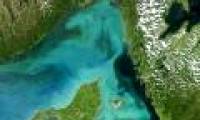
The flat-headed, half-meter-long fish survive in the ocean of 92 million years ago by eating plankton.

Recently, archaeologists discovered an ancient set of fossils, which existed about 65 million years ago. The fossil set is found in South Dakota and North America cliffs.

Scientists have discovered a large amount of mollusc creature dating back about 500 million years near Table Mountain, South Africa.

Although plankton are very small in size, they play a huge role in ecosystems - they can even tell us about climate change.

Scientists have discovered traces of living organisms that live on the surface of the International Space Station (ISS).

A new study has shown how marine plankton affects the process of creating clouds and regulating the climate on the Earth's surface.

Susanne Menden-Deuer, a marine expert at the University of Rhode Island in the US, and her colleagues observed Heterosigma akashiwo, a microalgae, in the lab. Livescience

The Cafeteria roenbergensis virus can represent an extremely large virus strain that has never been known and plays an important role in ecosystems.

People often divide insects into two types that are useful and harmful. However they are all links of diversity ...

Plankton are the foundation of the marine food chain, they need sunlight to carry out photosynthesis as well as other nutrients like nitrate, phosphate and iron to feed themselves.
 The flat-headed, half-meter-long fish survive in the ocean of 92 million years ago by eating plankton.
The flat-headed, half-meter-long fish survive in the ocean of 92 million years ago by eating plankton. Recently, archaeologists discovered an ancient set of fossils, which existed about 65 million years ago. The fossil set is found in South Dakota and North America cliffs.
Recently, archaeologists discovered an ancient set of fossils, which existed about 65 million years ago. The fossil set is found in South Dakota and North America cliffs. Scientists have discovered a large amount of mollusc creature dating back about 500 million years near Table Mountain, South Africa.
Scientists have discovered a large amount of mollusc creature dating back about 500 million years near Table Mountain, South Africa. Although plankton are very small in size, they play a huge role in ecosystems - they can even tell us about climate change.
Although plankton are very small in size, they play a huge role in ecosystems - they can even tell us about climate change. Scientists have discovered traces of living organisms that live on the surface of the International Space Station (ISS).
Scientists have discovered traces of living organisms that live on the surface of the International Space Station (ISS). A new study has shown how marine plankton affects the process of creating clouds and regulating the climate on the Earth's surface.
A new study has shown how marine plankton affects the process of creating clouds and regulating the climate on the Earth's surface. Susanne Menden-Deuer, a marine expert at the University of Rhode Island in the US, and her colleagues observed Heterosigma akashiwo, a microalgae, in the lab. Livescience
Susanne Menden-Deuer, a marine expert at the University of Rhode Island in the US, and her colleagues observed Heterosigma akashiwo, a microalgae, in the lab. Livescience The Cafeteria roenbergensis virus can represent an extremely large virus strain that has never been known and plays an important role in ecosystems.
The Cafeteria roenbergensis virus can represent an extremely large virus strain that has never been known and plays an important role in ecosystems. People often divide insects into two types that are useful and harmful. However they are all links of diversity ...
People often divide insects into two types that are useful and harmful. However they are all links of diversity ... Plankton are the foundation of the marine food chain, they need sunlight to carry out photosynthesis as well as other nutrients like nitrate, phosphate and iron to feed themselves.
Plankton are the foundation of the marine food chain, they need sunlight to carry out photosynthesis as well as other nutrients like nitrate, phosphate and iron to feed themselves.









 Strange 'rich people's MSG', once no one bothered to buy it
Strange 'rich people's MSG', once no one bothered to buy it More than 1,000 artifacts unearthed on Mount Wudang
More than 1,000 artifacts unearthed on Mount Wudang Why did Empress Dowager Cixi eat 20 eggs every day, but the chef had to prepare 500?
Why did Empress Dowager Cixi eat 20 eggs every day, but the chef had to prepare 500? 8 mystical medieval books that are even scarier the more you read them
8 mystical medieval books that are even scarier the more you read them The majestic natural scenery is overwhelming on the most dangerous road in the world
The majestic natural scenery is overwhelming on the most dangerous road in the world Strange wood with the ability to change color: Ranked among the world's top in hardness and durability, Vietnam also grows it
Strange wood with the ability to change color: Ranked among the world's top in hardness and durability, Vietnam also grows it What's inside the world's largest Three Gorges Dam?
What's inside the world's largest Three Gorges Dam? The Y chromosome is gradually disappearing, predicting that men have a new sex gene
The Y chromosome is gradually disappearing, predicting that men have a new sex gene